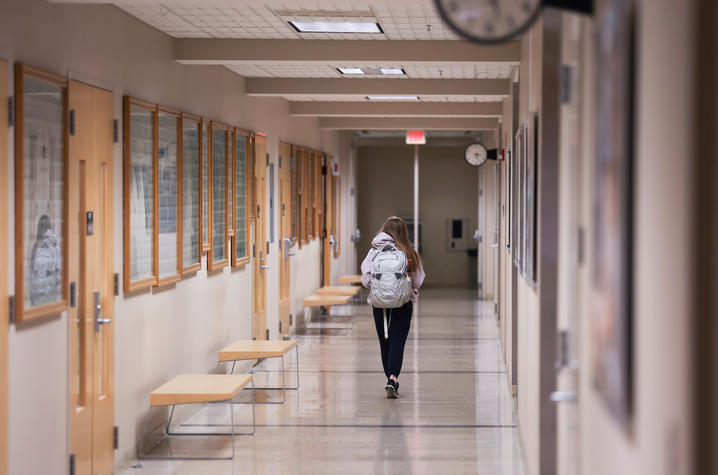Provost IMPACT Award supports mental health interventions for business, engineering students

LEXINGTON, Ky. (March 19, 2024) — The Institutional Multidisciplinary Paradigm to Accelerate Collaboration and Transformation (IMPACT) Awards were launched in 2023 to champion the necessary and groundbreaking work done by University of Kentucky faculty and other campus community members.
The inaugural IMPACT Awards total more than $600,000 — with a particular emphasis on proposals that are transdisciplinary, innovative and aligned with some aspect of The UK-PURPOSE, the UK Strategic Plan.
In 2024, IMPACT will continue to fund projects similarly aimed at supporting the university to continue leading in teaching, research, service and care.
This spring, UKNow is highlighting the 2023 IMPACT Award projects and the faculty who are leading them. Today, we learn more about the project titled “Accelerating Cultural Transformation in Business and Engineering to Support Mental Health.”
Sarah Wilson, an assistant professor in the Department of Chemical and Materials Engineering in the Stanley and Karen Pigman College of Engineering; Joseph Hammer, associate professor and director of counseling psychology training in the Department of Educational, School, and Counseling Psychology in the College of Education; and Alexis Allen, acting associate dean of undergraduate studies and associate professor in the Gatton College of Business and Economics; are conducting research aimed at supporting business and engineering students’ mental health.
Anxiety, depression and other mental health concerns are more common in college students than some may realize. For an increasing number of first-year students, the culture shock can have serious consequences. In fact, a study by the American Psychological Association found that one in three teens faces a mental health disorder during their freshman year.
While business and engineering students aren’t necessarily more likely to have a mental health concern, they are significantly less likely to seek help than other cohorts of college students.
The results of the project will allow for the development of interventions that can increase colleges’ capacity to create academic environments that support student wellness.
UKNow caught up with the research team to learn more about the project. You can read more in the Q&A session below.
UKNow: How has the IMPACT award inspired innovation at UK with your research?
Often, interventions that are designed for students do not consider the students’ perspectives. This project has allowed our research team to integrate students into the research process. Through focus groups, we have been able to work with students to not only identify challenges that exist related to mental health culture within their program but also identify potential solutions to these challenges. This has allowed us to identify novel mental health interventions that could drive cultural change across each of the colleges.
UKNow: What positive impact will your research have on Kentucky and beyond?
One of the benefits of stakeholder-driven intervention development is that they can increase buy-in to the intervention. Through this study, we have been able to identify changes students think could effectively drive cultural change across business and engineering to support student well-being. These interventions range from opportunities to create more peer community within the programs to policy and procedural changes that could be implemented at the college level.
We look forward to sharing the outcomes of the focus groups with administrators and talking about how we can drive change to facilitate student well-being.
Further, we have been able to implement a mental health training program across both areas (business and engineering) — allowing us to reach more than 3,600 students. Through this program, we have measured increases in student knowledge about mental health resources available on campus. Ensuring students are aware of how to access support for their mental health has been a big project outcome.
UKNow: How did you decide on this particular topic or research area?
I (Sarah Wilson) started doing research on mental health in engineering after I attended a conference where it was clear many faculty were interacting with students who were struggling with their mental health. This was really the motivation for getting started, and we quickly found national data that showed engineering students are in a group of students that are very unlikely to access professional support for their mental health, so that’s where we started. Through this grant, we were able to expand out to business, because students who are enrolled in business show similar patterns in terms of the prevalence of mental health distress and the lower likelihood of seeking professional help.
UKNow: What comes next for your research?
We are hoping to continue to develop and implement interventions aimed at improving the mental health culture within engineering and business. Trying to change culture cannot just be a one-time thing. We have to be persistent and continue to make efforts towards changing the way students, faculty and administrators think about and prioritize mental health within their lives. This will take time and buy-in from administrators across the colleges. We also hope to expand out to other colleges across the university.
If you or someone you know is at risk, you can call the National Suicide Prevention Lifeline at 1-800-273-8255. You can also text 741-741.
As the state’s flagship, land-grant institution, the University of Kentucky exists to advance the Commonwealth. We do that by preparing the next generation of leaders — placing students at the heart of everything we do — and transforming the lives of Kentuckians through education, research and creative work, service and health care. We pride ourselves on being a catalyst for breakthroughs and a force for healing, a place where ingenuity unfolds. It's all made possible by our people — visionaries, disruptors and pioneers — who make up 200 academic programs, a $476.5 million research and development enterprise and a world-class medical center, all on one campus.




